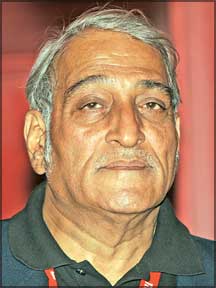IFFK 2009: More gleanings
K.S. Sivakumaran
Hardly two months have passed the last December 14 to International
Film Festival of Kerala (IFFK) is still in my inner mirror projecting
the images and print and electronic media. Take for instance I read by
Cheri Jacob K with a very important Indian personality associated with
that country's cinema.
|

Mohan Agashe |
Kerala as we know is a south Indian state in the south west of India.
Its capital was earlier known as Trivandrum for easy pronunciation, but
the Malayalam name now which sounds also Thamil is Thiruvanantapuram,
The IFFK is held annually in the state capital. Besides the capital
there are few more important cities in Kerala. Kerala was in the Chera
kingdom of yore. The VIP concerned is Mohan Agashe. He is a renowned
psychiatrist. He was a former Director of the prestigious FTII (Film and
Television Institute of India) in Pune, India. He is an actor too.
In his interview he said quite a few interesting things about cinema
and psychiatry. Quotes:
"Psychiatry and films are different. As an actor you have to let go,
surrender your ego, it is a performing art. In order to perform well,
you have to erase yourself, your brain. To practice psychiatry you have
to use your brain. The purpose of psychiatry is to change behaviour. The
purpose of film is to understand that behaviour."
Elaborating further he said: "Films have helped me more in my
psychiatry. In psychiatry I got information from texts; but films
converted it into knowledge by giving me insights into why/ why not and
how we are humans. Psychiatry tries to cure, films try to reveal and
cope; what you wan to live with and what you want to change, in deepest
sense; what you are born with and what you have acquired; in this sense
films and psychiatry are complementary to each other." There is one
other point that Mohan Agashe makes which is relevant for us to identify
the different genres of films screened.
Over to him "The difference in genres-parallel, mainstream,
international- is like tasting different food for variety. I get a
dynamism which I enjoy; not being 'fixated'; say humour for humour sake.
Films have to be meaningful, genuine and relevant; issue based. My
division is between Good and Bad cinema."
How does he define 'Good Cinema'?
"My operational definition of good cinema is that it is something
which you are watching, and when the screening ends, the subject begins
in the mind."
In Sinhala films I have noticed that actors Sanath, Saumya and
Chathurani and to some extent Dilhani perform well where the characters
have a psychological dimensions.
[email protected]
|



